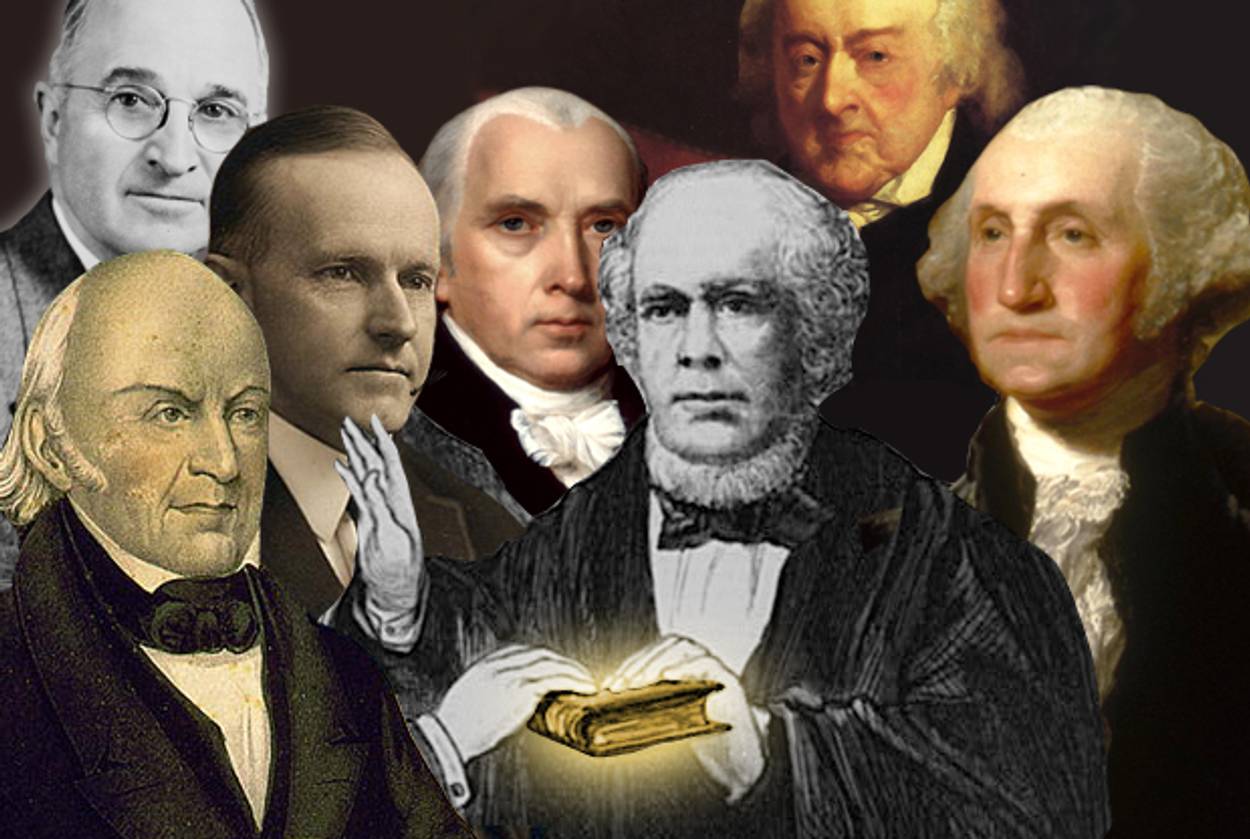Obama’s Historical Chutzpah
Does the president really know more about Judaism than John Adams and James Madison did?




It’s hard to know where to begin with Barack Obama’s recent pronouncement to a group of Conservative Jews that he “probably knows about Judaism more than any other president.” So, why not start at the beginning, with George Washington? It’s only by looking at the past that the scope of Obama’s historical chutzpah becomes clear.
Washington knew the Old Testament well. His favorite book was Micah; his favorite verse 4:4—“But they shall sit every man under his vine and under his fig tree; and none shall make them afraid: for the mouth of the Lord of hosts hath spoken it”—appears no fewer than 11 times in his diaries. He invoked it again in his famous letter to the Hebrew Congregation at Newport in August 1790. “May the children of the stock of Abraham who dwell in this land continue to merit and enjoy the good will of the other inhabitants—while everyone shall sit in safety under his own vine and fig tree and there shall be none to make him afraid,” he wrote. He grounded America’s experiment in religious freedom in republican theory. “The Government of the United States, which gives to bigotry no sanction, to persecution no assistance, requires only that that they who live under its protection should demean themselves as good citizens in giving it on all occasions their effectual support.” In so doing, Washington became, as scholar Harry V. Jaffa has pointed out, the first secular ruler to call Jews his countrymen.
Washington’s principal adviser, Alexander Hamilton, whose Jewishness is a subject of historical dispute, publicly extolled Jews, under whom he studied as a boy on the island of Nevis. He saw in their suffering and success evidence of “some great providential plan.” To “discredit them” would “destroy the Christian religion,” Hamilton later argued in a debate.
President John Adams and his son John Quincy Adams agreed with Hamilton, writing separately and favorably of Jews and a Jewish state long before it was fashionable to Mordecai Manuel Noah, America’s first Jewish consul, founder of New York University, and his day’s most famous Jew. “I will insist that the Hebrews have [contributed] more to civilize men than any other nation,” John Adams wrote to F. A. Van der Kemp, a Dutch-born Enlightenment thinker, condemning the anti-Semitism of Enlightenment writer Voltaire. “If I was an atheist and believed in blind eternal fate, I should still believe that fate had ordained the Jews to be the most essential instrument for civilization the nations. … [Jews] are the most glorious nation that ever inhabited this Earth. The Romans and their empire were but a bubble in comparison to the Jews. They have given religion to three-quarters of the globe and have influenced the affairs of mankind more and more happily than any other nation, ancient or modern.”
President James Madison also studied Hebrew, electing to spend an additional, post-graduate year to focus on it. During the Revolution, Madison turned to Haym Salomon, a Polish-born financier who offered loans well below market rate to members of the Continental Congress. Writing to fellow Virginian Edmund Randolph in September 1772, he praised Salomon’s generosity: “The kindness of our little friend in Front Street (Salomon) near the coffee-house is a fund which will preserve me from extremities, but I never resort to it without mortification as he obstinately rejects all recompense.” Salomon was captured by the British and condemned to death, but he escaped by bribing the guards with gold.
Salomon wasn’t alone among Jewish patriots. Indeed, it’s fair to say that Jewish finance underwrote much of the cost of the American Revolution, something the unjustly neglected President Calvin Coolidge noted with favor in a dedication of the Jewish Community Centre on May 3, 1925. Their generosity, often never repaid, came because “the Jewish faith is predominately the faith of liberty,” Coolidge declared. “From the beginnings of the conflict between colonies and the mother country, they were overwhelmingly on the side of the rising revolution.” He listed the merchants—overwhelmingly Jewish—who cast their lot with the colonists in signing the non-importation resolution of 1765, also known as the Stamp Act, which directly taxed American colonists by restricting their freedom of commerce. “Hebraic mortar cemented the foundations of American democracy,” Coolidge said. “[T]he patriots who laid the foundation of this Republic drew their faith from the Bible. … Every inheritance of the Jewish people, every teaching of their secular history and religious experience, draws them powerfully to the side of charity, liberty, and progress.”
The list of pro-Jewish statements evincing serious thought about Jews could go on and on. “I had faith in Israel before it was established, I have faith in it now,” President Truman declared 60 years ago last week on the occasion of David Ben-Gurion’s visit to the White House. “I believe [Israel] has a glorious future before it—not just another sovereign nation, but as an embodiment of the great ideals of our civilization.” With words like this, there could be little doubt as to Truman’s position on Israel—but just to be clear, he made sure that America was the first nation to recognize it.
To all of this, Obama might say: I hosted the first White House Seder; I knew the late Arnold Wolf, the controversial Chicago rabbi; I am friends with Bettylu Saltzman, who works with J Street; and I’ve read Philip Roth. But intimate knowledge of the milieu of Hyde Park Jewry does not mean fundamentally understanding Judaism.
CORRECTION, June 4: An earlier version of this piece said that John Adams translated the Old Testament into English.
Charles C. Johnson is author of the forthcoming Coolidge: Then and Now.
Charles C. Johnson is author of the forthcoming Coolidge: Then and Now.